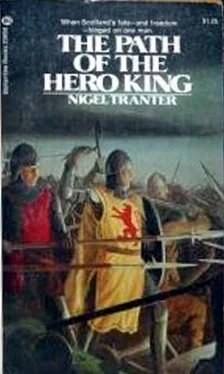Chapter Fourteen
Drawing rein, Robert Bruce pointed, laughing heartily, easily, in more frank and honest mirth than his colleagues had heard from him for long. Bruce had been a mirthful young man once, too lighthearted for his father, seeing life through amused eyes wherever possible; if twelve years of war, sorrow, treachery and disaster had overlaid his high spirits, not with gloom so much as with a habit of sternness, of grim wariness, of self-protective constraint, it was all only an armour. The true man underneath was still sanguine, lightsome, laughter-loving- if scarcely, any more, young of heart.
The occasion of mirth now was, as so often, the mild misfortune of another. Gilbert Hays horse had stumbled in one of the innumerable black peat-hags of the vast desolation of the moor, all but pitching its rider over its left shoulder. Gibbie, who had been dozing in his saddle in the warm afternoon sunshine of high August, had saved himself only by a major effort-but had overdone his sudden backwards and sideways jerking to such extent as to topple over the other side of the brute and into a little pool whose brilliant emerald-green coverlet was only a mossy scum to hide the thick black peat-broth beneath. Floundering in this glutinous mire, the unfortunate Lord of Erroll had covered himself more comprehensively in mud the more he struggled.
Peace, Gibbiepeace! the King besought.
Still, you. Float on it-do not swallow it!
Similar unkind advice and comment came from all around, few failing to find amusement in the situation in that still fewer there had not been in something of the same predicament in these past days of mighty journeying across the rugged face of Highland Scotland.
A
curse … on you all! the bemired Gilbert spluttered.
This God-forsaken country! He hurled a handful of the filth in the general direction of his monarch.
You are welcome … to your..
stinking realm!
Lese-majestie! Bruce declared severely. And, as Thomas Randolph jumped down to go to the aid of his friend, added, Put him under, Thomas-under! Lese-majestie is a grievous sin. And to throw mud at the Lords Anointed worse! Sir Hugh alone may do that-eh, my friend? Since you alone do not recognise me as King!
Young Rosss grin faded, with his uncertainty as to how to take that
He made a cheerful hostage, and mixed well with the others-better than the more reserved Randolph ever had done;
but he was always uneasy at the Kings mild mockery and teasing.
He in fact paid Bruce just as much respect as any of the company, while yet refusing resolutely to accord him the royal style and address. He got over his present difficulty by dismounting and aiding Randolph to extricate Hay.
While this was proceeding, Bruce turned in his saddle to look back, northwards, over the fantastic scene. In all Scotland there is nowhere quite so savagely and remorselessly desolate, so enormous in its waterlogged, rock-ribbed, peat-pocketed emptiness, as the Moor of Rannoch, so awe-inspiring in the sheer sullen immensity of its seventy square miles of brooding moon-landscape, and all only intensified and thrust into starker relief by the loveliness of its frame of distant blue mountains-Buchaille Etive and all the Glen Coe giants to the north the Black Mount massif to the west, the peaks of Rannoch and Glen Lyon to the east, and all the complex of Mamlorn to the south. Here is scenery, sheer territory, on a stupendous, daunting scale, and man the merest irrelevance.
Yet it was the men, the thousands of men, that Bruce considered, strewn over the face of the land behind him like ants on a forest floor. There were, of course, scouts ahead; but he, in the lead, had paused perhaps five miles out into the waste from the towering jaws of Glen Coe, Behind him, almost all the way back to those fierce mountain portals, his army straggled and spread. It seemed absurd even to think of it as an army, in the circumstances. After the long constrictions of the glens, where their 8,000 had perforce made a narrow column six miles and more in length, now men and animals spilled out and scattered far and wide, to pick a way for themselves across the wilderness of lochs and loc hans pools, runnels, burns, bogs and peat-mosses, as best they could, more like a plague of voles in migration than a royal and military force. The Highlanders took it all in their stride, of course; but the Lowland troops and cavalry were making heavy going, and the progress was slow indeed. If they were to be attacked now, on the verge of Lorn as they were, they would be helpless as a vast flock of stupid sheep. Except that no one could attack them effectively here, on any large scale, for the same conditions would apply to them. Bruce was not fretting, therefore, at their vulnerability, as he would have been almost anywhere else; nor even at the delay-though it did make nonsense out of his declaration that this descent upon Lorn should be swift and unheralded. MacDougall, in fact, could hardly have failed to be informed of their return, days ago. Although he could not be sure, of course, as yet, that they intended to turn due west and attack him; they could be on the way south, by Strathfillan and Loch Lomond, to Lennox and the Lowlands.
Something of all this was in the Kings mind, when mens attention was diverted from Gilbert Hay. Two of the forward scouts were coming hurrying back, Highlanders mounted on sturdy broad-hooved garrons that coped with the treacherous ground as born to it. They were nearing Campbell country here, and the scouts were drawn from that clan. As usual with the Highlanders, ignoring the King, they carried their news directly to their chief.
A company approaching, Sire, Sir Neil called.
Some two miles ahead yet. A small company, mounted. But armoured.
Armour never failed to reveal itself, even at great distances, in sunlight.
How small?
No more than two score.
They may be scouts of a larger force. Take a party forward, Sir Neil, to investigate.
When, a little later, the Kings entourage topped one of the innumerable basalt ridges which ribbed that expanse, to view even more extensive barrenness ahead, it was also to perceive that Campbell had had no difficulty with the newcomers. He was quite close at hand, indeed, riding back with a little group of knights, handsomely equipped and mounted Lowlanders. And over these fluttered a silken banner showing a blue chief above a white field.
Douglas! Bruce cried, and dug in his spurs.
They met at no very salubrious spot, amongst reeds, tussocks and standing water; but careless of royal status or dignity, the King leapt down at the same moment as did the other, and strode to embrace the younger man heartily.
Jamie, lad-heres joy! My good Sir James! he exclaimed.
* What brings you here I know not. But you are welcome, by the Rude!
Welcome indeed. For I have missed you, Jamie.
Your Grace … my liege … Sir Robert! Douglas could not find words, shaking his head.
It has been long …
Aye, long. But our joining again the sweeter. Let me look at you.
He held the other at arms length.
Aye-James Douglas as ever was!
Why should I change, Sire? But you-you are changed, to my sorrow! You are thin, wasted. I heard that you had been sick. You are not well, yet…?
Well, yes-well again, lad. That is past You drive yourself too
hard, Sire. Too much campaigning, scouring the face of the land, hard
living. You were not bred to Urn. Bred to it? No. I was not bred
to it Were you? Were any of us, save these Highland chieftains? Yet it is my blood and birth and breeding that has put me in the middle of Rannoch Moor this day, that set my hand to this plough. But … what brings you to Rannoch, Jamie? You, whom I left my lieutenant in the South?
Читать дальше












